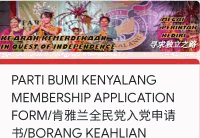
Int'l NGO calls PM to repeal laws that allegedly eroded Sarawak's MA63 rights . Sabah Sarawak Rights Australia New Zealand (SSRANZ) an international NGO based in Australia, commented on PM Anwar Ibrahim’s statement on Malaysia's commitment to and solidarity with the Palestinian people’s “struggle to free Palestine from the grip of Zionist Israel” made in a press conference on 20 Dec 2022.
SSRANZ President Robert Pei said the issue of Palestine has been used by various politicians as a handy political populist platitude. However, it is well known that the new Prime Minister has for a long time sincerely supported the recognition of Palestine as a free and independent state and therefore must be respected for his unwavering anti-imperialist and anti-colonialist position on Palestine.
He said “In recent times we have witnessed many remnant colonies of the colonial past becoming independent states such as Palau, Timor‑Leste, Montenegro, Serbia, and South Sudan. Other countries are also seeking independence such as Scotland, Catalonia, Palestine and Bouganville, all of which have followed their own paths to seek self-determination. All these examples affirm the principle of the universal legal right to freely choose one’s destiny”.
He said in 1948 Palestine was denied independence and betrayed by the British government for its complicity in the creation of Israel through the Zionist takeover, occupation and seizures of Palestinian territory. This led to 66 years of Palestinian resistance.
With his enlightened view on the Palestinian issue, the Prime Minister should also see the similarity with the British government’s unlawful imposition of the Malaysia federation plan on Sabah (then called North Borneo) and Sarawak in 1963, instead of granting independence to them.
The SSRANZ President said, “It is in relation to the subject of the incomplete decolonisation and independence of Sabah and Sarawak that I wish to raise for your attention and call on your government to seek dialogue with respective Borneo state governments, Borneo nationalists and interested political parties for a peaceful and smooth devolution of power and transfer of sovereignty back to Sabah and Sarawak.”
SSRANZ maintains that the process of Malaysia formation pursuant to MA63, was tainted with legal defects and illegalities in violation of international law which rendered the treaty not legally binding. Malaysia was not a legally constituted federation as the MA63 treaty was null and void from the beginning for lack of legal capacity, consent and legal object for the formation (contrived to deny Sabah and Sarawak real independence to implement the UK Grand Design).
The Prime Minister may also be aware that in 1946, 2 years before the foreign takeover of Palestine, the British Government had with flimsy justifications, annexed the independent state of Sarawak and the North Borneo Chartered Company administered territory of Sabah as British Crown colonies. At the time, the British solemnly promised that both colonies would eventually be given independence.
However, in breach of their repeated undertakings, the British colonialists imposed its so-called decolonisation by transferring the sovereignty and colonial control of 2 colonies to the Malayan federation pursuant to the void Malaysia Agreement 1963 (MA63).
Malaysia was established under coercive emergency conditions without a referendum and suppression of the 1962 Brunei Anti-Malaysia armed uprising and arbitrary arrests and unlawful detentions of thousands of “suspected” opponents to the British-Malayan Malaysia plan.
The British government said this was “decolonisation” through “independence in Malaysia”. This was only a euphemism for re-colonisation without a real change in status. It is legally absurd and impossible for any country to be “independent” within another country.
The 2 Borneo territories were just the sacrificial victims of the British Grand Design and cold war geopolitics in their strategic redrawing of the map by merging them with Malaya and Singapore in a federation. It was a design shared by Malayan elites who according to a former Sarawak governor Sir Anthony Abell, had their eyes on the vast territories of North Borneo and Sarawak and their oil.
He drew the Prime Minister’s attention to the legal issue of MA63 validity as an international treaty which is now being challenged in the Bomeo High Court.
When the UK and Malaya signed MA63 with Sabah Sarawak and Singapore on 9 July 1963, the 3 territories were still British crown colonies (up to 16 September 1963) and not sovereign states with the legal capacity to make binding international treaties.
This international law principle on treaty-making was confirmed by the International Court of Justice (ICJ) in the 2019 Chagos case where it was concluded that the British government could not make a binding international agreement with its colony Mauritius which was under its full control in 1965. (The ICJ also reaffirmed that the right to self-determination is now a part of international law).
The issue of legal capacity and consent is linked to the fact that neither Sabah nor Sarawak had directly elected representation or representatives democratically authorised by a referendum in the MA63 negotiation. This was in reality negotiated on their behalf by their respective British Governors. The Borneo people were ostensibly involved after the terms were agreed to and drawn up.
The declassified colonial documents on Malaysia formation disclosed that the British government was legally advised of this flaw but had proceeded to misrepresent to the Borneo people that they were equal partners on the international level and competent to sign the MA63 treaty, for “presentational purpose”. The then-colonial Attorney-Generals also signed MA63 on behalf of Sabah and Sarawak respectively.
Contrary to the British and Malayan governments’ claim that Malaysia was a voluntary association or union, a referendum was never held to seek the people’s consent by precisely gauging the people’s wishes given freely on choosing Malaysia or independence. This lack of consent to MA63 also invalidates the treaty.
If Malaysia was a voluntary union, then as Lord Lansdowne the 1963 IGC chairman stated, its members have the intrinsic right to “secede” from the federation at any time and this right need not be included in the constitution. He had said this in response to Sarawak Council Negri members’ demand for an escape clause to be inserted in the constitution.
This corollary right of free exit was exercised in 1965 when the Malaysian government agreed with Singapore that it could exit the federation. The British led by example by holding their BREXIT referendum in 2019 and the UK exited the European Union in 2020.
International law does not prohibit members of a political union from secession or exit for independence.
In addition to the above legal issues, the SSRANZ President pointed out that MA63 and Malaysia’s legitimacy also remains in doubt as the Manila Accord signed on 31 July 1963 by Malaya with Indonesia and the Philippines, requiring the resolution of the Philippines’ Sabah claim has never been resolved. This means that it was unclear that the UK could effectively transfer sovereignty over Sabah to Malaya in 1963.
Malaysia formation was therefore not lawfully concluded in compliance with this international agreement, registered with the United Nations in 1965.
MA63 was clearly invalid on the facts, and before it could be “implemented”, the Prime Minister is duty-bound to settle this issue as it has international legal consequences on the legitimacy of Malaysia as an international entity.
He said that even if it could be proven that MA63 was a valid treaty, it would nevertheless, have been terminated under international law by the federal government’s multiple treaty violations since 1965.
Robert Pei pointed out that the multiple violations of MA63 had also brought about fundamental changes of circumstances making it impossible to fully implement the treaty and thus allowing termination of the treaty (if valid) and they include the following:
• MA63 was voided by UK Government’s failure to promptly register the treaty on signing- Article 102(2) of the UN Charter states that “No party to any such treaty or international agreement which has not been registered in accordance with the provisions of paragraph 1 of this Article may invoke that treaty or agreement before any organ of the United Nations”. The failure to register MA63 till 1970, had the effect of rendering it void. This is a defect which must be examined in the context of the current attempts to “implement” MA63.
• Singapore Exit destroyed the MA63 fundamental term based on the component structure of a 4 member federation. It also violated the Basic Structure Doctrine. Prior to this, the Malaysia concept was to have 5 component members including Brunei. The Brunei Sultan had refused to sign MA63 in the last minute as he considered the union not to be in his people’s interest. MA63 should have been renegotiated because of these changes but it was covered up and not done.
• MA63 was not recognised by Federal Constitution till 2020 thus rendering Malaysia illegitimate & all legislation null & void from 1963 despite the 2021 belated attempt to ratify and recognise the treaty.
• Subsequent illegal amendments to MA63 abrogating fundamental or foundational terms whether by constitutional amendment or normal legislative alterations.
• Institutionalisation of 1970 NEP race religion-based apartheid state destroyed MA63 concept of secular multiracial state.
• Failure of the declared Malaysia Objective to “develop” Sabah and Sarawak which was replaced by the development of Malaya at their expense by keeping them impoverished through the illegal expropriation of their wealth and land.
In conclusion, he said Sabahans and Sarawakians had been induced to give up independence for integration of their countries into the Malayan Federation renamed Malaysia in 1963, with promises of security development and prosperity which the late PM Tunku Abdul Rahman declared was a principal objective justifying the formation.
If this objective has failed the people are entitled to seek other alternatives including full independence to manage and develop their own states based on their abundant natural resources. Many Borneo people see the agenda for the closer integration of Sabah and Sarawak with Malaya as a neo-colonial ambition.
The inalienable right to self-determination is recognised by international law and the United Nations and is not negotiable.
End of statement 22/12/2022
Robert Pei-
President, Sabah Sarawak Rights Australia New Zealand









